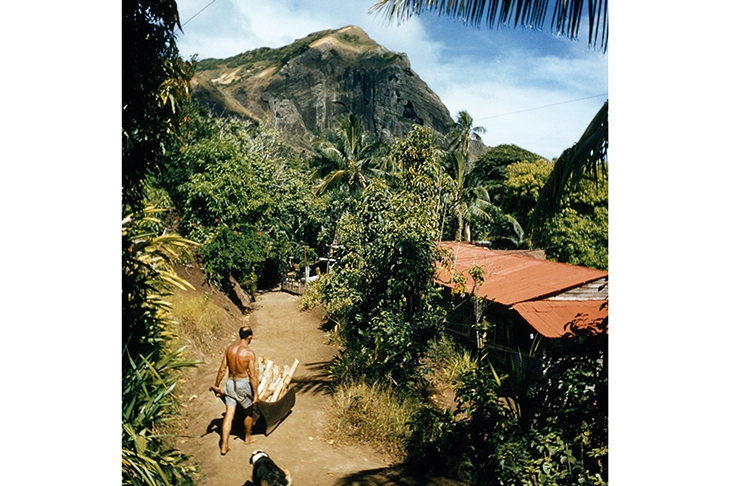Islands have a special appeal. We imagine that on an island we’ll somehow ‘get away from it all’. In the era of Brexit and climate concerns, Pitcairn Island in the Pacific, more than 3,000 miles from the nearest landmass, is flooded with requests from people hoping to settle there. I would advise them to think again.
I spent several months living on Pitcairn — a mile-by-mile-and-a-half volcanic rock battered by a hostile ocean, home to a handful of descendants from the Bounty mutineers and the Tahitians they took with them. But I did not, as I’d hoped, discover a self-reliant paradise. What my time on Pitcairn taught me is that islands are no Edens.
Adamstown, the capital and only settlement, is a tortured sea-surrounded village, thwart with divisions, where bullies and petty squabbles govern daily life. Far from feeling free, conformity on Pitcairn is so strong that even holding hands in public is forbidden by law. The 38 islanders may be the descendants of mutinous rebels, but they’re too terrified to object even to the very worst of treatment among themselves. Soon after I left Pitcairn, seven of the island’s 11 men were charged with child sexual abuse.
Throughout the trials, victims testified to putting up with being assaulted because there was nowhere to go and no one to turn to among the inter-related islanders. Men could molest without fear of censure. The risks of falling out with your neighbour/relative/daughter’s rapist were far too great to cause a fuss. Pitcairners rely on each other for absolutely everything, from sharing fish and food to manning the longboats, the only way of reaching the passing ships that are the sole source of supplies. The adult men are needed to do this, so adult men can get away with doing almost anything else too.
In the late 19th century, an American Seventh Day Adventist missionary boat anchored off Pitcairn and converted the inhabitants en masse. It stultified the island. Dancing is still banned. Seafood, abundant in Pitcairn waters, mustn’t be eaten but only chopped up and used as bait for very bony unpleasant fish known as nanwe.
I had imagined myself spending heady days picking ripening fruit from the trees. But although fruit grows all over the tiny amount of accessible land, including the infamous breadfruit imported on the Bounty, most islanders prefer to go to the shop — open once a week for an hour — to buy tinned peaches. Like everything else, the peaches are several months, if not years, past their sell-by date. Even eggs are imported thousands of miles on ships that call irregularly every few months.
We think of islands as providing sanctuary, but forget that island living means constant surveillance. On Pitcairn, everyone knew what everyone else was doing, every minute of the day. We all walked around barefoot along the red clay paths (there are no roads and no cars). Islanders can read each other’s footprints and tell who has trodden the path before them, and, most importantly, with whom. But while you are constantly in company, you are always alone. In a rare moment of openness, Pitcairner Denis Christian told me: ‘You don’t know what lonely is. Not where you’re from.’
Pitcairn is an unhappy, violent, deeply troubled and incestuous place. But when I wrote such in my book Serpent in Paradise, I was criticised for saying so by people who’d never landed on its rocky shore. (Few have.) The image of a paradise isle is so embedded in our imaginations and so important to us that it made people angry to hear the truth.
In Britain we have written about islands, painted them, and most of all dreamed about them for centuries. From Captain Cook to Treasure Island, from Lucy Irvine’s Castaway to Desert Island Discs, islands are embedded in our imagination. This year marks 300 years since the publication of The Life and Strange Surprising Adventures of Robinson Crusoe, credited as the first English novel. By the end of the 19th century, Daniel Defoe’s story had more editions, spin-offs and translations than any other book in the history of western literature.
Our country’s watery physical separation is equated with innate political and ultimately psychological independence and strength. But the lesson of Pitcairn is that the idea of island life as paradise is a delusion. I’m just glad I escaped.






Comments